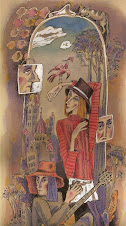Cheat from my homework: Why you need to know fairy tales
March 5, 2012
Put your hands up if your parent or guardian never read you fairy tales as a child. No one? Okay, how many of you remember the morals to the stories? I promise these answers are really easy:
Little Red Riding Hood courtesy of Wikipedia
Little Red Riding Hood (LRRH): Be careful when visiting people’s houses and don’t trust a stranger.
Rumpelstiltskin (R): Don’t be greedy.
The Three Little Pigs (TTLP): Do hard work and it will pay off–do it right and it will last.
Have you considered how other details are pertinent to a writer’s knowledge-bank as a modern storyteller? The “cheat from my homework” part comes into this post because fairy tales was the topic of my class today. It was after I had an uh-ha! moment that the class’ message began to click into place.
Since numbers make up a large part of symbolism in fairy tales, when the teacher was talking about symbols, themes, etc, I thought this:
What if the three-act-structure evolved from fairy tales?
This may or may not be so; however, legions of advice has been published about fairy tales and their meanings so what I wanted to hone in on are two aspects which were brought up in class.
1. Recurrent themes (today’s post)
2. Recurrent motifs (future post)
I’m going to run through various themes that are common amongst many fairy tales. As you read through the list, remember each story, notice how they give a different spin on each theme, and how this applies to us as storytellers today.
* Quest – LRRH: A little girl is travelling to visit her sick grandmother; TTLP: sent out by their mother to “seek their fortune”.
* (includes breaking) Law – Cinderella: must be home by midnight (Cinderella knew she had to be home by midnight according to her fairy godmother’s rules); LRRH: The girl’s mother told her to go straight to her grandmother’s place (breaking the law/promise: instead, she stopped to pick flowers and this is how the wolf caused her trouble).
* Death of a parent – Cinderella: Cinderella is an orphan; Snow White: Snow White’s mother, the original queen, dies almost as soon as her daughter is born.
Here are others, which I’m sure you will recall the fairy tales where they occur in:
* Love
* Dungeon/Tower
* Birth
* Separation
* Adolescence
* Injustice
You know what I’m going to say next, don’t you? As I wrote this post, I realised that my favourite series is all the above!
Wait for it (if you haven’t guessed) …
The main trio in the first film and the final installment
The Harry Potter series
As I did above, here’s the list relative to the Harry Potter series. (Note that the ending of the series featured fairy tales directly, via the Brothers Grimm fairy stories, which tied up the point of the series!)
* Quest – Harry Potter and his friends must find a way to kill Lord Voldemort without Harry dying too.
* (breaking) Law – Harry constantly breaks the school rules (usually ends up costing him 50 points for Gryffindor at a time) to save the day.
* Death of a parent – Pretty much self-explanatory. Harry’s parents are killed–not just at any time, but when he is a baby (similar to the way it happens in fairy stories).
* Dungeon/Tower – Moaning Myrtle in the girls bathroom, Sirius in Azkaban, basically the whole darn Hogwarts is a dungeon trapping them in sometimes.
* Adolescence – We, the readers, watch as Harry and his friends grow from little children to the adult age in wizardry.
* Injustice – Throughout books one to six, Professor Severus Snape is overly mean to Harry no matter what he does, for no solid, known reason to the reader.
And it goes on!
Now: HANDS UP if Harry Potter has influenced you as a writer or as a person significantly more than any other book you’ve read.
Harry Potter isn’t just a success because of the amazing trio (Harry, Hermione and Ron), or that children can overpower strong and magical adults, or that the trio go on cool adventures. The moral/message/themes/motifs/etc in Harry Potter are so powerful because they share commonalities with fairy tales.
Fairy tales have been told for centuries because they teach messages to children that help them grow into better people — and they tell it so easy to understand in an effective way through story.
Harry Potter is still one of the most popular series (and I expect will be in centuries to come too) fifteen years after it was first published because it teaches us more about life, people, morals, etc. Understanding and expanding your knowledge of fairy tales will help you develop your storytelling skills too.
Remember to stick around because I’ll be following up this post with another one on “Motif”.
http://rebeccaberto.wordpress.com/2012/03/05/cheat-from-my-homework-why-you-need-to-know-fairy-tales/#comment-775
I Left MAGA Host SPEECHLESS on CNN
1 week ago










No comments:
Post a Comment